“I used to think that actors were just people who liked to put make-up on their faces every night. That producers, directors, and all the rest were part of the whole absurd foolishness and vanity. I was wrong. If there’s a debt owed, it’s my debt to you–to all of you–for showing me a new world–a new frontier–the real democracy of the theater. Thank you for that.”
Moss Hart, Light Up the Sky
Archives for 2009
TT: We know every part by heart
So here it is at last, the distinguished thing: The Letter opens tomorrow night. The final dress rehearsal was as smooth as silk. The invited audience applauded wildly. Paul Moravec and I went home happy. Now it’s out of our hands.
If I have time, I’ll post and tweet throughout the weekend. If not…not. Meanwhile, here’s how all of us in Santa Fe are feeling today:
* * *
UPDATE: Two details from last night that I forgot to share:
• My wife doesn’t impress easily, but I finally brought off the feat by speaking the following eight words: “Hilary, I’d like you to meet Tom Ford.”
• Mrs. T gave me the perfect present after the rehearsal–a vintage Givenchy tie that was previously owned by Virgil Thomson, the great composer-critic. (She knew him at the very end of his life.) This time I was impressed.
TT: That was no lady
Life goes on, and even though I’m in Santa Fe, I filed a drama column on schedule for today’s Wall Street Journal. (I’m taking next week off.) In it I report on my visit to the Stratford Shakespeare Festival. Here’s an excerpt.
* * *
If you’re looking for one-stop theatrical shopping, go north to the Stratford Shakespeare Festival, which in summertime more or less takes over the smallish Ontario town for which it is named. This year the festival is presenting 14 plays on four stages, and the fare is richly varied. Much is being made of the fact that under Des McAnuff, the new artistic director, the festival has cut back on Shakespeare (three plays this season, five last season) and beefed up the budget for its roster of crowd-pleasing musical comedies. Be that as it may, classical theater remains Stratford’s mainstay, and Brian Bedford’s brilliantly zany staging of “The Importance of Being Earnest” is good enough to justify a trip to Canada all by itself.
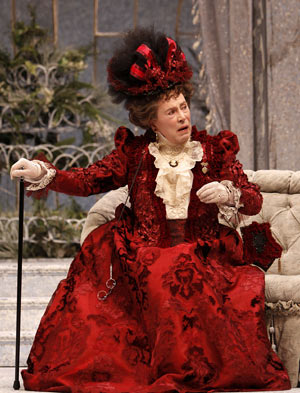 Mr. Bedford’s production of Oscar Wilde’s ever-enchanting comedy of turn-of-the-century English manners is built around a gimmick that turns out not to be the least bit gimmicky: In addition to directing, he also plays Lady Bracknell, the money-hungry monster of propriety who is determined to stop Algernon and Gwendolen (Mike Shara and Sara Topham), her nephew and daughter, from marrying beneath themselves. I don’t care for camped-up drag acts, but Mr. Bedford, who makes himself up to look like Queen Victoria and carries himself like a snooty gargoyle, is giving us something completely different, an impersonation so sharp-witted and closely observed that it demands to be accepted on its own daring terms….
Mr. Bedford’s production of Oscar Wilde’s ever-enchanting comedy of turn-of-the-century English manners is built around a gimmick that turns out not to be the least bit gimmicky: In addition to directing, he also plays Lady Bracknell, the money-hungry monster of propriety who is determined to stop Algernon and Gwendolen (Mike Shara and Sara Topham), her nephew and daughter, from marrying beneath themselves. I don’t care for camped-up drag acts, but Mr. Bedford, who makes himself up to look like Queen Victoria and carries himself like a snooty gargoyle, is giving us something completely different, an impersonation so sharp-witted and closely observed that it demands to be accepted on its own daring terms….
Martha Henry’s production of Anton Chekhov’s “Three Sisters,” by contrast, is a satisfyingly traditional, bracingly direct ensemble piece whose only novelty is the fact that it is being performed on the three-quarter-round stage of the Tom Patterson Theatre. At first I wondered whether the cast might be a bit underpowered, but then I got on Ms. Henry’s unassuming wavelength, and before I knew it I was caught up in Chekhov’s sad comedy of wasted lives. To see a classic like “Three Sisters” in so plain a setting is to appreciate anew the clear-eyed intimacy of theater in the round, and Ms. Henry uses that intimacy to maximum advantage….
* * *
Read the whole thing here.
TT: Does Broadway need women?
An enormous amount of ink is being spilled over “Opening the Curtain on Playwright Gender: An Integrated Economic Analysis of Discrimination in American Theater,” a paper by a Princeton undergraduate which purports to show, among other things, that female artistic directors of theater companies are more likely to discriminate against women playwrights than their male counterparts.
The paper, by Emily Glassberg Sands, concludes–as was already widely believed–that women playwrights get the short end of the stick in America. But is that really what the numbers crunched in “Opening the Curtain on Playwright Gender” demonstrate? I took a close and unhurried look at Sands’ facts, figures, and analysis, and my “Sightings” column in Saturday’s Wall Street Journal tells what I found there. Pick up a copy of Saturday’s paper and see what I have to say.
UPDATE: Read the whole thing here.
TT: Almanac
“I walked toward Once in a Lifetime for the last time–that final walk every playwright takes toward his play, knowing that it is no longer his, that it belongs to the actors and the audience now, that a part of himself is to be judged by strangers and that he can only watch it as a stranger himself. The main consideration of his day, the keystone that has dictated his every waking moment, the cause that has enlisted his being for all these months, is at an end. He moves toward his destination with mixed emotions–it is the completion he has sought, but there is the ache of finality in it. He is at last a spectator–a spectator with the largest stake in the gamble of the evening, but a spectator nonetheless.”
Moss Hart, Act One
TT: Present at the creation
I just heard via Facebook from Barbara Brown, my old high-school English and drama teacher. She directed the first play I ever saw, a production of Blithe Spirit that was performed in the gymnasium of the Smalltown Junior High School forty-one years ago. That production caused me to become stage-struck, with consequences of which readers of this blog need not be reminded. A couple of years later I joined the Smalltown High School Drama Club, and Barbara directed me in stagings of Harvey and The Innocents. I never was much of an actor, alas, but I learned things from her that I’ve never forgotten.
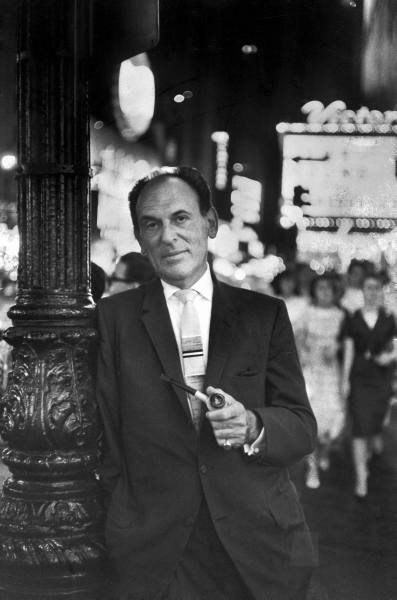 Barbara left Smalltown around the same time that I did, and I hadn’t heard anything from or about her between then and this morning. As I read her message, I was reminded of the wonderful passage from Act One in which Moss Hart describes the backstage telegrams he received on the opening night of Once in a Lifetime, his first collaboration with George S. Kaufman and the play that made him famous:
Barbara left Smalltown around the same time that I did, and I hadn’t heard anything from or about her between then and this morning. As I read her message, I was reminded of the wonderful passage from Act One in which Moss Hart describes the backstage telegrams he received on the opening night of Once in a Lifetime, his first collaboration with George S. Kaufman and the play that made him famous:
Opening-night telegrams may seem a foolish and perfunctory convention, but they are not. Those words are the only ones likely to penetrate the minds and warm the hearts of the people who receive them at this particular moment. Opened backstage in that chill interval of waiting for the house lights to darken and the curtain to rise, they perform the admirable function of saying that hope still runs high. Far-fetched little jokes seem uncommonly humorous in opening-night telegrams, and ten words with an unexpected name signed to them can be strangely touching….
The years leaped out of each envelope with quicksilver flashes of memory, the old jumbled with the new. Time seemed to stop as I looked at each name and the years each name recalled, and something like calm began to settle over me.
Needless to say, Western Union is now a thing of the distant past, but Facebook and Twitter are taking up the slack, and it meant as much to me to hear from Barbara as it did to Moss Hart to hear from all the people in his past who sent telegrams to the Music Box Theatre on that fateful night in 1930. So thank you, dear teacher, for thinking to get in touch with me today. You were the first in a long line of people who made The Letter possible. I never forgot you, and I never will.
TT: Did Maugham know best?
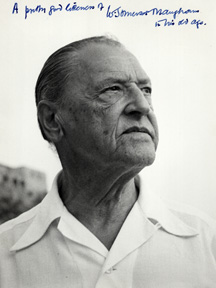 A few days ago I heard Jonathan Richards, a Santa Fe-based actor and writer, give a public reading of “The Letter,” the short story by W. Somerset Maugham that inspired Paul Moravec and me to write The Letter. Our opera is based on Maugham’s own 1927 stage version of “The Letter,” but it was the story that was our starting point–I hadn’t yet read the play when I first got the idea to turn “The Letter” into an opera–and more than two years had gone by since I last looked at it. Hence I found it fascinating to hear Jonathan read “The Letter” out loud, not least because I’d forgotten that it was the source of the original version of one of the best lines in the libretto.
A few days ago I heard Jonathan Richards, a Santa Fe-based actor and writer, give a public reading of “The Letter,” the short story by W. Somerset Maugham that inspired Paul Moravec and me to write The Letter. Our opera is based on Maugham’s own 1927 stage version of “The Letter,” but it was the story that was our starting point–I hadn’t yet read the play when I first got the idea to turn “The Letter” into an opera–and more than two years had gone by since I last looked at it. Hence I found it fascinating to hear Jonathan read “The Letter” out loud, not least because I’d forgotten that it was the source of the original version of one of the best lines in the libretto.
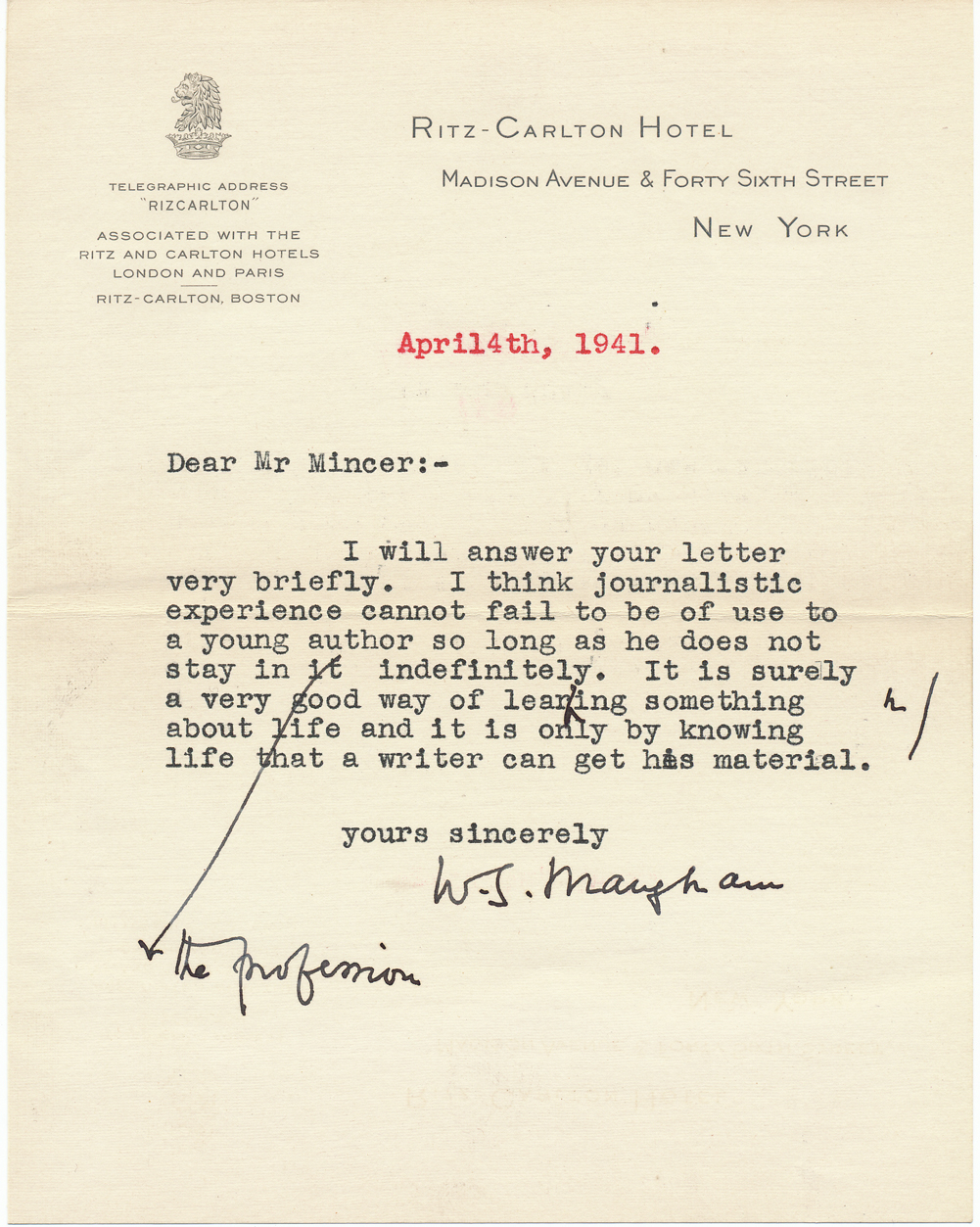 In the second scene of the opera, Howard Joyce, the very proper lawyer who takes on the case of Leslie Crosbie, a woman who shot and killed a neighbor whom she claims tried to rape her, reflects on his client’s plight. “One never knows what respectable women are capable of,” he muses. My libretto contains most of the best-known lines of dialogue from Maugham’s stage version of The Letter, but that particular line isn’t in the play, and when Jim Maddalena, who plays the role of Joyce, told me that it was his favorite line in the opera, I wondered whether I’d actually come up with it myself.
In the second scene of the opera, Howard Joyce, the very proper lawyer who takes on the case of Leslie Crosbie, a woman who shot and killed a neighbor whom she claims tried to rape her, reflects on his client’s plight. “One never knows what respectable women are capable of,” he muses. My libretto contains most of the best-known lines of dialogue from Maugham’s stage version of The Letter, but that particular line isn’t in the play, and when Jim Maddalena, who plays the role of Joyce, told me that it was his favorite line in the opera, I wondered whether I’d actually come up with it myself.
The answer, it turns out, is that I based it on a line from the original short story, one that had slipped my mind until I heard Jonathan read it out loud at Collected Works last week:
“The fact is, I suppose,” he reflected, “that you can never know what hidden possibilities of savagery there are in the most respectable of women.”
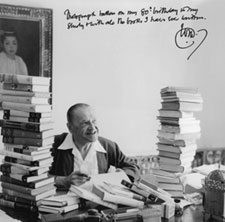 So far as I can remember, this is the only line from “The Letter” that can be found in the opera but not in the play. Even so, it’s a good example of how I changed virtually all of Maugham’s language in order to make it pithier and more lyrical. Try to imagine Jim singing that handsomely worded but rather complicated sentence and you’ll start to get an idea of the process by which a librettist turns the script of a play into the libretto of an opera.
So far as I can remember, this is the only line from “The Letter” that can be found in the opera but not in the play. Even so, it’s a good example of how I changed virtually all of Maugham’s language in order to make it pithier and more lyrical. Try to imagine Jim singing that handsomely worded but rather complicated sentence and you’ll start to get an idea of the process by which a librettist turns the script of a play into the libretto of an opera.
* * *
Mrs. T and I had a busman’s holiday yesterday: we went to see the Santa Fe Opera‘s production of Don Giovanni. I’ve been so busy with The Letter of late that it’s been more than a year since I saw an opera not written by Paul Moravec and me, and it was a great treat to relax and let Mozart and da Ponte do the heavy lifting.
Tonight it’s back to work. The final dress rehearsal of The Letter starts at nine o’clock. Definitely no tweeting–I expect to be completely preoccupied–but I’ll let you know how it went on Friday.
TT: So you want to see a show?
Here’s my list of recommended Broadway, off-Broadway, and out-of-town shows, updated weekly. In all cases, I gave these shows favorable reviews (if sometimes qualifiedly so) in The Wall Street Journal when they opened. For more information, click on the title.
Warning: Broadway shows marked with an asterisk were sold out, or nearly so, last week.
BROADWAY:
• Alfred Hitchcock’s The 39 Steps (comedy, G, suitable for bright children, reviewed here)
• Avenue Q * (musical, R, adult subject matter and one show-stopping scene of puppet-on-puppet sex, closes Sept. 13, reviewed here)
• The Little Mermaid * (musical, G, entirely suitable for children, closes Aug. 30, reviewed here)
• South Pacific * (musical, G/PG-13, some sexual content, brilliantly staged but unsuitable for viewers acutely allergic to preachiness, reviewed here)
OFF BROADWAY:
• The Fantasticks (musical, G, suitable for children capable of enjoying a love story, reviewed here)
• Our Town (drama, G, suitable for mature children, reviewed here)
• Ruined (drama, PG-13/R, sexual content and suggestions of extreme violence, closes Sept. 6, reviewed here)
IN ASHLAND, OREGON:
• The Music Man (musical, G, very child-friendly, closes Nov. 1, reviewed here)
IN CHICAGO:
• The History Boys (drama, PG-13/R, adult subject matter, too intellectually complex for most adolescents, extended through Sept. 27, reviewed here)
• A Minister’s Wife (musical, PG-13, closes Aug. 2, reviewed here)
IN GARRISON, N.Y.:
• Pericles and Much Ado About Nothing (Shakespeare, PG-13, playing in repertory through Sept. 6, reviewed here)
CLOSING SOON ON BROADWAY:
• Mary Stuart (drama, G, far too long and complicated for children, closes Aug. 16, reviewed here)
CLOSING NEXT WEEK IN CHICAGO:
• A Minister’s Wife (musical, PG-13, closes Aug. 2, reviewed here)
CLOSING SUNDAY ON BROADWAY:
• The Norman Conquests (three related comedies, PG-13, comprehensively unsuitable for children, playing in repertory through Sunday, reviewed here)
